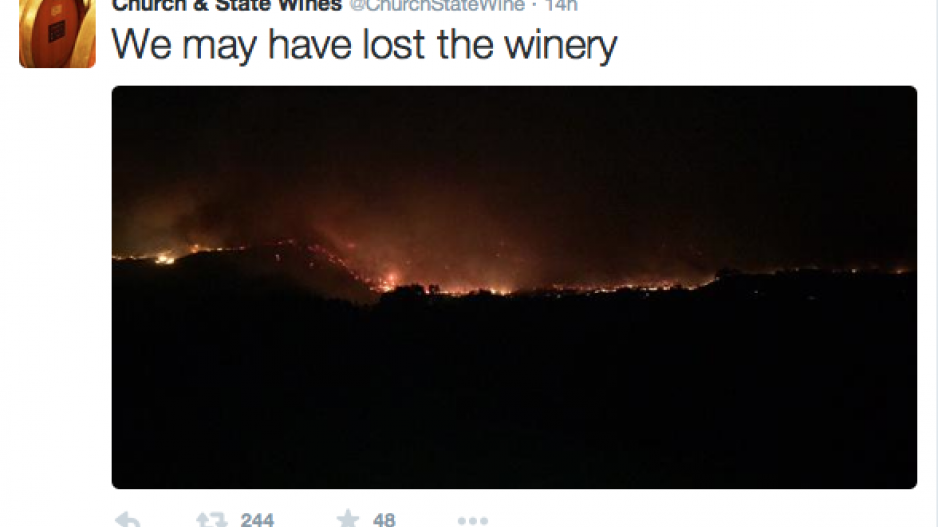A brush with wildfire has winery owners in one of B.C.’s most prolific winemaking regions thinking about what they’ll do differently in the future.
A fast-moving grass wildfire came within metres of several wineries in the town of Oliver’s Golden Mile on August 14. It prompted an evacuation order for Oliver, which remained in place for several days.
As fire travelled down the mountain behind his property, Joe Luckhurst and his staff hauled hoses to the perimeter of his Road 13 Vineyards and used water they had been collecting in tanks to wet down the ground and the roofs of buildings.
He’s now planning to install irrigation heads on the fence posts at the edge of his property.
“If something like this does start happening we can just flick a switch and just start soaking immediately rather than drag a bunch of hoses up,” Luckhurst said.
Armed with a garden hose, Bruce Fuller, owner of Rustico Farm and Cellars, also stayed on his property while the fire raged just a few feet away from his vineyard.
Both credit the efforts of firefighters in safeguarding their properties.

B.C. is expected to experience more frequent and intense wildfires in the future as temperatures continue to rise. Climate scientists are predicting another year of warm temperatures for B.C. in 2016, as warming ocean temperatures combine with an El Niño expected to be one of the most intense on record.
The BC Wildfire Service encourages homeowners in B.C. to clear away anything flammable, such as shrubs or dead wood, and to keep grass short and watered to reduce the risk of wildfire spreading to their property from drifting embers.
The winery owners said they’re aware of the importance of keeping their properties clear, but Luckhurst said he’ll be more proactive about clearing out the brush between his property and the mountain.

Inventory of B.C. wildfires as of August 21 | B.C. Wildfire Service
“Once the fire got close we did start tearing up brush as fast as we could,” he said, “and I think now we will start more of a process to keep it clear.”
John Pullen, whose family owns Church and State Wines, said he’s never given a lot of thought to preparing his property because it’s surrounded by other well-irrigated vineyards.
The winery owners believe their crop won’t be affected by smoke taint, a phenomenon that transfers a bad, smoky taste to finished wine when grapes are exposed to thick smoke.
“I seriously do not think there will be taint,” winemaker and Tinhorn Creek CEO Sandra Oldfield wrote to a Business in Vancouver reporter August 15. “Even talking with Rustico this morning the smoke was going south – he was breathing OK even right next to fire. [The smoke] really has to be pervasive.”
Added Pullen: “We’re going to keep tasting things all the way to harvest and track it right through to bottle. But it looks like everyone came away pretty unscathed.”
The Oliver wineries are stressing that they’re back to business as usual and are welcoming visitors. Thanks to the hot, dry, summer, they’re also expecting a better-than-normal crop.
In 2003, Gordon Fitzpatrick’s Cedar Creek winery was damaged by fire, and he lost some of his red wine to smoke taint. While his insurance covered business interruption and property damage, it did not cover the smoke-tainted crop because not enough had been lost, Fitzpatrick said. “It has to be a real disaster.”
Fitzpatrick, who sold Cedar Creek in 2014, said the recovery included hiring a soil expert to assess the ground around the property for risk of mudslides. After a fire, the risk of mudslides is heightened because the fire-hardened ground does not absorb water as well.
“We used trees that had fallen but hadn’t burnt to create a barrier in case of mudslide,” he said.
After a wildfire, the province, municipality or regional district may do an assessment for flooding or landslides, depending on who is responsible for the affected land, a Ministry of Forests, Lands and Natural Resource Operations spokesman wrote in an email.
@jenstden




